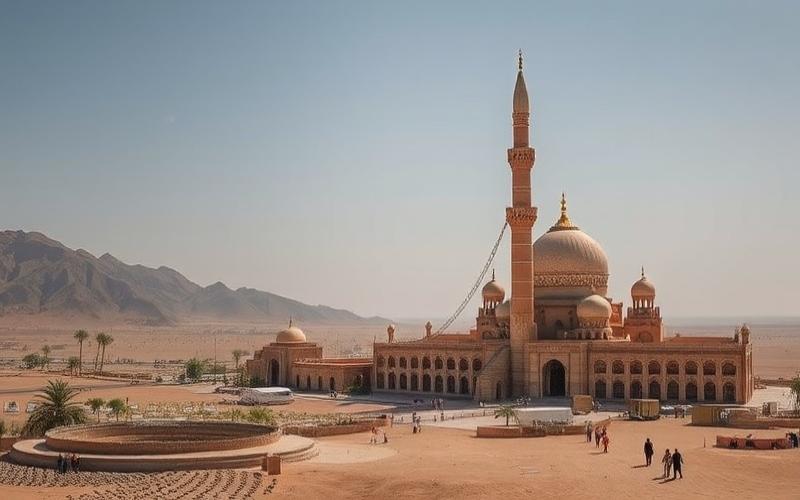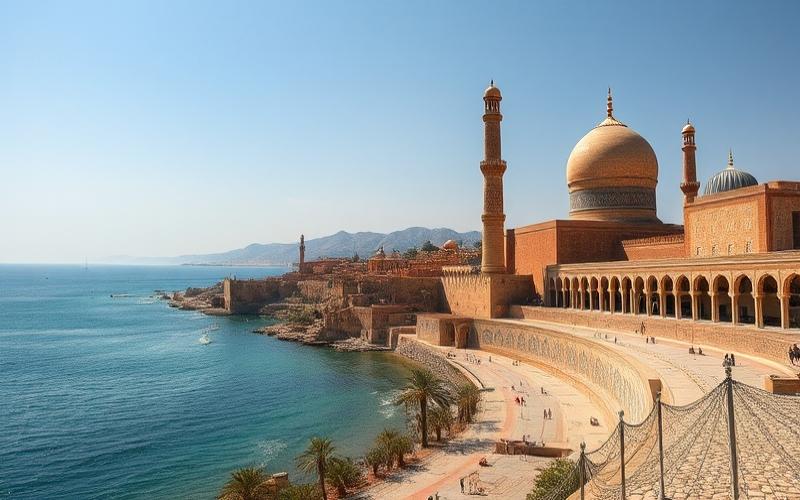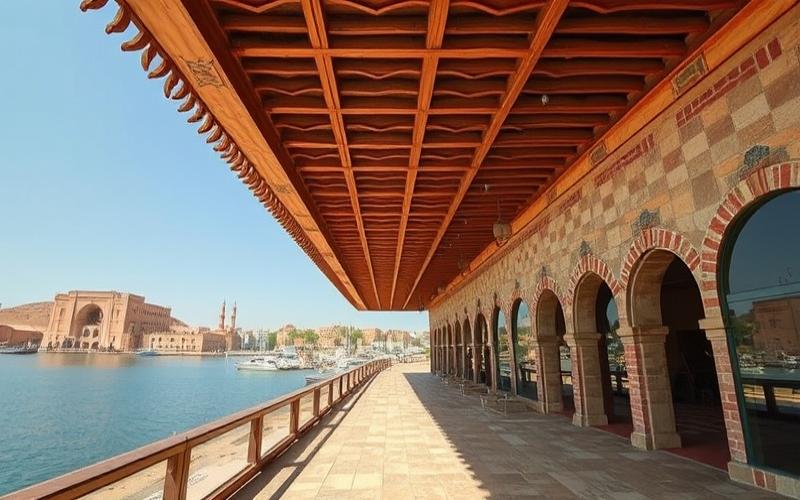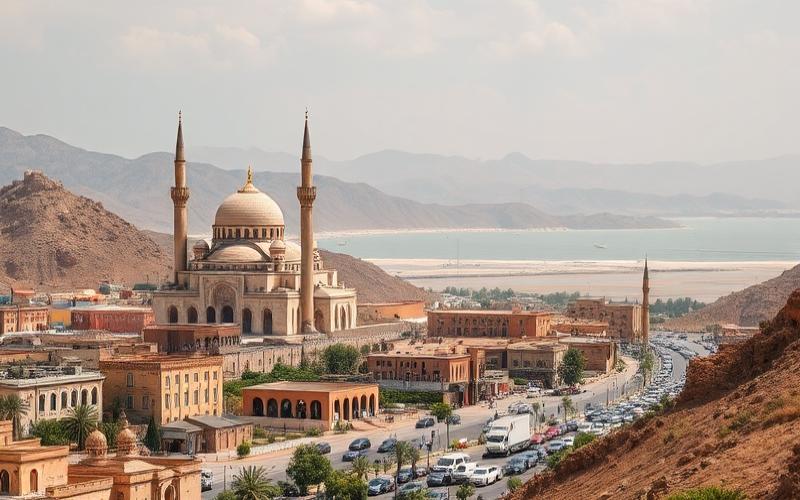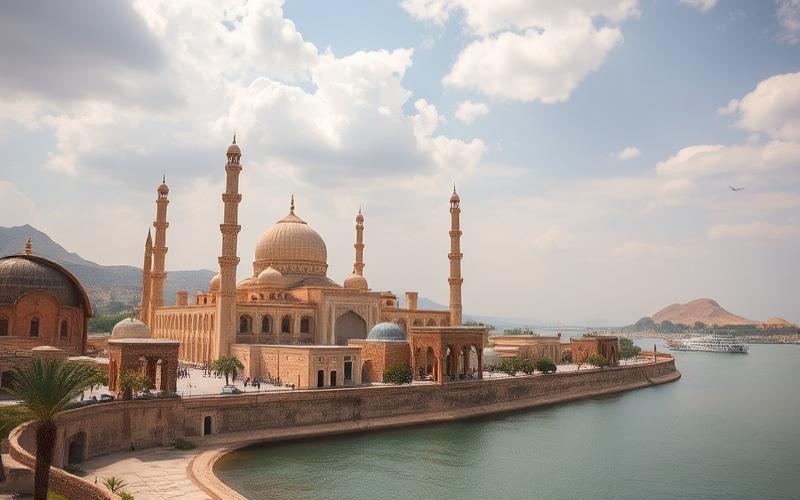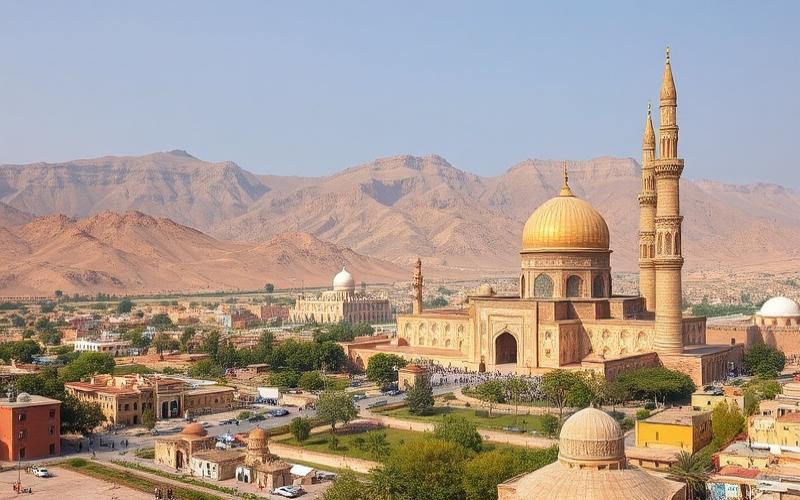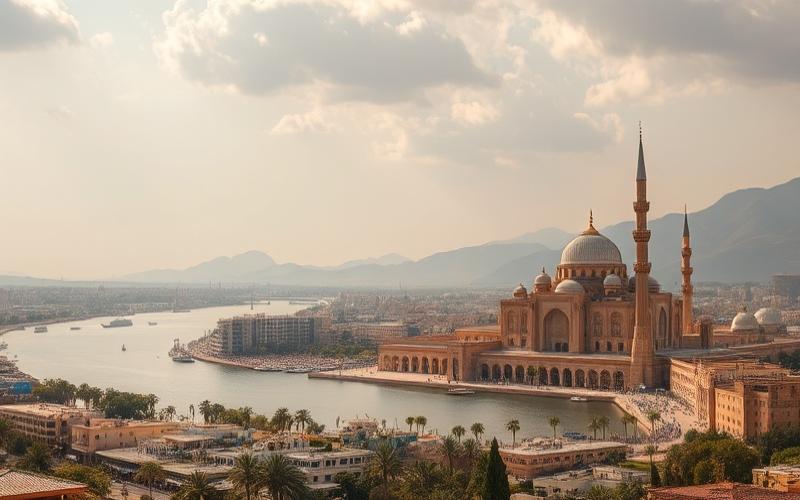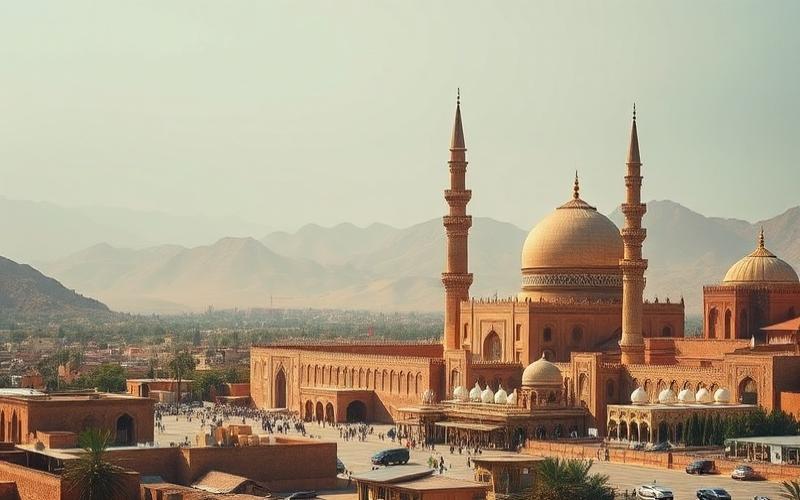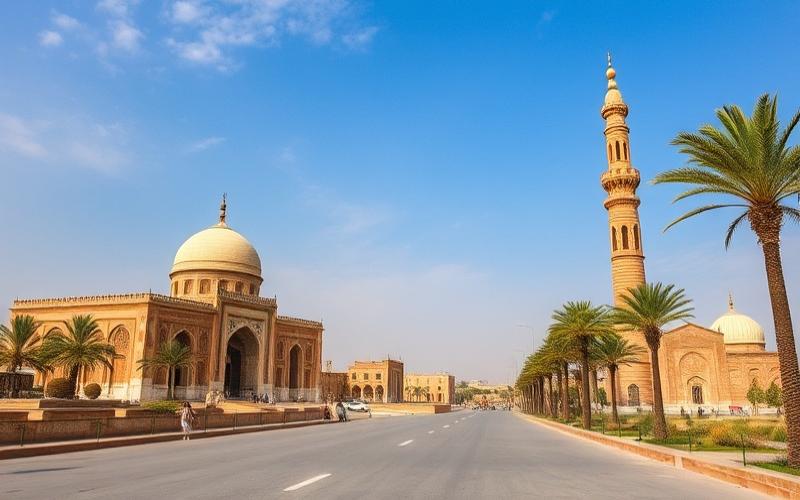
 Published on and written by Cyril Jarnias
Published on and written by Cyril Jarnias
In a globalized world where exploring new horizons is more accessible than ever, investing in international real estate presents an enticing opportunity, and Bahrain particularly stands out as a prime destination for expatriates like you.
This small Gulf kingdom offers a booming real estate market with favorable conditions that increasingly attract foreign investors. With its modern infrastructure, appealing living environment, and welcoming culture, Bahrain has everything to attract investors looking to combine quality of life with profitability prospects.
In this guide, we break down the reasons why investing your funds in Bahrain could be one of the smartest decisions for anyone wanting to diversify their real estate portfolio while enjoying exceptional quality of life.
Legal Considerations for Expatriates Investing in Bahrain
Legal Considerations for Expatriates Investing in Bahrain
Local Laws and Regulations Concerning Foreign Ownership:
- Expatriates can acquire real estate with full ownership rights only in designated freehold areas.
- Outside these areas, only long-term leases (up to 99 years) are available to non-citizens.
- Relevant legislation includes the Property Registration Law of 2002, supervised by RERA (Real Estate Regulatory Authority) and SLRB (Survey and Land Registration Bureau).
Types of Properties Accessible to Expatriates:
| Designated Area (2025) | Main Characteristics |
|---|---|
| Juffair | Popular urban neighborhood, apartments, strong rental potential |
| Amwaj Islands | Luxury villas and apartments, private beach, attractive to international investors |
| Seef District | Business sector, modern condos, shopping centers |
- Foreigners can invest in residential, commercial, and investment properties in these areas.
Visa and Residency Requirements:
- Property purchase in a designated area may enable obtaining a residency permit (duration and conditions depend on investment amount and area).
- Required documents include a valid passport, residency permit (CPR), proof of financial capacity, sales contract, and mortgage-free certificate.
Taxes and Fees on Purchase and Ownership:
| Type | Rate or Cost |
|---|---|
| Registration fees | 2% of purchase price |
| Notary/legal fees | 0.5–1% |
| Capital gains tax | None |
| Annual property tax | None |
| Rental income tax | None (for individuals) |
| VAT | 5% (only on new or off-plan commercial sales) |
Bahrain is considered highly tax-friendly for foreign real estate investors.
Restrictions or Permissions for Renting or Selling:
- Foreign owners have the right to rent, sell, mortgage, or transfer their property in authorized areas.
- It is recommended to check specific contract clauses: some properties may restrict resale or rental to other foreigners, or impose special conditions.
- Maintenance responsibilities and condominium fees should be clarified at purchase.
Practical Tips for Legal Security:
Always consult an experienced Bahraini real estate lawyer to:
- Verify the legality of the transaction and property title.
- Clarify responsibilities and charges associated with the property.
- Ensure the contract contains no hidden restrictions on rental or resale.
- Avoid common pitfalls (e.g., non-refundable deposits, hidden defects, cancellation conditions).
- Navigate possible recourse in case of dispute (civil courts, arbitration, mediation via RERA).
List of Contractual Points to Watch:
- Geographic restriction: verify area eligibility.
- Residency conditions: required investment amount, visa duration.
- Freedom to rent/resell: examine contract clauses.
- Distribution of charges and maintenance responsibilities.
- Conditions for deposit refund in case of non-completion.
Consulting a specialized local lawyer is highly recommended to secure your investment and anticipate any legal difficulties when buying, renting, or reselling your property in Bahrain.
Good to Know:
Expatriates can invest in properties located in designated areas in Bahrain but must be aware of geographic restrictions and visa requirements. It is advisable to consult a lawyer to navigate local regulations and understand applicable taxes, particularly for subsequent sale or rental of the property.
Administrative Procedures for Acquiring Property as an Expatriate
Administrative Procedures for Property Acquisition in Bahrain by an Expatriate
Types of Accessible Properties and Restrictions
Expatriates can purchase residential real estate only in certain designated areas, called “freehold properties.”
Main Districts Open to Foreigners:
- Ahmed Al-Fateh District
- Hoora District
- Bu Ghazal District
- Seef District
- Northern Manama (Diplomatic Area)
Specific Accessible Real Estate Projects:
- Durrat Al-Bahrain
- Amwaj Islands
- Dannat Hawar
| Property Type | Accessible to Expatriates? | Geographic Area |
|---|---|---|
| Apartment | Yes | Designated areas |
| Villa | Yes | Designated areas |
| Residential land | Yes | Authorized projects |
| Commercial real estate | No (different rules) | Strong restrictions |
Essential Legal Steps
- Choose real estate property in an authorized area.
- Apply for purchase permit, typically including:
- Official application form.
- Clear copy of passport and ID card.
- Certificate of good conduct.
- Verify property title and official value indicated on the title deed.
- Draft and sign sales contract, ideally assisted by an independent lawyer.
Registration Process
The deed must be registered with Bahraini land authorities, who formalize the transaction in the foreign buyer’s name.
A local notary or lawyer can oversee legal compliance, verify documents, and ensure legal security.
Additional Fees and Taxes
- Registration fees: typically between 1% and 2% of total property price.
- Legal fees: fixed fees or percentage depending on chosen firm.
- No real estate income tax in Bahrain, but administrative fees apply during transactions.
Warning: if purchasing with local bank financing, payment default may result in a temporary total “travel ban” preventing departure from the country until full settlement.
Always seek independent services from a lawyer specialized in local real estate law to avoid any conflict of interest with the selling agent or property developer.
Verify that all official documents are translated into English or French if necessary; have every contract clause reviewed before final signature.
It is recommended to never rely exclusively on real estate agents or developers regarding legal aspects.
Useful Resources and Local Agencies That Can Assist Expatriates
- Legal firm specialized in international real estate law based in Manama (list available from embassies).
- Bahraini national land agency (“Land Registration Bureau”) for direct verification of official titles.
For any complex procedure, contact the French or European embassy in Bahrain directly for referral to certified professionals.
Checklist:
- Verify your purchase is located in an area authorized for foreigners
- Prepare all required personal documents
- Be accompanied by an independent lawyer from negotiation stage
- Anticipate additional transaction-related fees
- Keep all official written records during exchanges with sellers/agencies
Good to Know:
Expatriates wishing to purchase property in Bahrain must obtain a purchase permit and can acquire properties in certain reserved areas; assistance from a lawyer or notary is advised to navigate the legal system, and it is essential to plan for additional taxes such as registration tax.
Financial Implications and Investment Strategies Suitable for Expatriates
Acquiring real estate in Bahrain by expatriates presents specific financial implications, mainly related to favorable local taxation and unavoidable additional fees.
Potential Costs During Real Estate Purchase:
- No income tax, capital gains tax, or inheritance tax for individuals, including expatriates.
- No recurring property tax is applied on real estate ownership.
- Municipal tax: 10% of average monthly rent for any housing rented by an expatriate. This tax may be included in the rent or paid separately; it is essential to verify this point with the owner or real estate agent.
- Social contributions:
- Expatriate employee: 1% of gross salary (mainly related to unemployment and work accident insurance).
- Employer: 3% of gross salary.
- Real estate agency fees: typically between 1% and 2% of purchase price (varies according to transaction complexity).
- Notary/administrative fees:
- Land registration fees and official documentation (fixed amount or proportional to price).
| Cost Type | Estimated Amount | Frequency |
|---|---|---|
| Municipal tax | 10% of monthly rent | Monthly |
| Social contribution | Employee: 1%, employer: 3% | Monthly |
| Agency fees | ~1–2% purchase price | One-time |
| Notary fees | Variable (~0.5–1%) | One-time |
Tips for Optimal Financial Management:
- Fully benefit from bilateral agreements against double taxation signed by Bahrain with several European and Asian countries. This allows foreign investors to avoid multiple taxation on their international income.
- Systematically check tax obligations in your home country. American citizens remain taxable in the United States even if investing from Bahrain—though they can benefit from exemptions such as the Foreign Earned Income Exclusion.
- Use local services specialized in Bahraini real estate law to anticipate all hidden fees related to registration or land transfer.
Tax Benefits & Incentives:
Bahrain stands out for:
- General absence of direct taxation on real estate income
- Limited indirect taxation (VAT only applicable in specific cases)
Some free zones also offer specific advantages to attract foreign investment, such as accelerated administrative procedures or enhanced protection of property rights.
Adapted Strategies to Maximize Return/Minimize Risk:
List of best practices:
- Geographic diversification within the Bahraini market itself (residential vs commercial sectors).
- Example: Some investors combine high-end rental housing with commercial offices to reduce sector exposure in case of local economic slowdown.
- Regular comparative analysis between neighborhoods popular with expatriates to identify those offering better rental value/annual return.
- Example: The diplomatic district historically shows superior stability due to constant demand among international executives.
- Thorough understanding of local legislation before any acquisition:
- Possible restrictions according to type/lease/duration
- Local versus foreign preferential rights
| Recommended Practice | Objective |
|---|---|
| Portfolio diversification | Reduce sector risk |
| Comparative market analysis | Optimize rental return |
| Specialized legal advice | Secure regulatory compliance |
Concrete Examples – Successes & Challenges Encountered:
List illustrating lived experiences:
- A French investor successfully tripled his return by diversifying assets between furnished residences for international families and commercial premises near the seaport. He optimized cash flows through good local tax mastery and fine analysis of seasonal rental potential.
- Conversely, a British group encountered a major obstacle during quick resale post-health crisis; failing to anticipate certain local administrative restrictions related to foreign owner transfer, they suffered significant delay impacting their cash flow. The solution was finally found via specialized legal counsel enabling accelerated regularization with competent authorities.
Solutions to Common Obstacles:
- Systematically surround yourself from the start with recognized local experts
- Perform complete due diligence before final signature
- Integrate into overall strategy all regulatory constraints specific to “expatriate investor” status
To succeed in real estate investment as an expatriate in Bahrain, it is therefore essential not only to master all direct/indirect costs but also to adopt a methodical approach based on smart diversification, rigorous comparative analysis, and specialized professional support throughout the process.
Good to Know:
Expatriates investing in Bahrain must anticipate costs such as agency fees and notary charges, while benefiting from tax advantages offered to foreign investors. To maximize returns, diversify your portfolio and conduct comparative analyses, drawing inspiration from successes of other investors who have overcome local legislative challenges.
Tax Aspects and International Financing Options for Real Estate in Bahrain
Bahrain offers a particularly advantageous tax regime for real estate investors, both local and foreign. There is no personal income tax, no capital gains tax on real estate, and no wealth tax. This applies to both residents and non-residents. Furthermore, there is no value-added tax (VAT) for most residential real estate transactions.
Tax Implications for Foreign Residents and Expatriates:
- Expatriates and foreign investors are not subject to income tax, nor taxes on capital gains when reselling real estate property.
- There is no real estate wealth tax in Bahrain.
- Bilateral tax conventions are limited, but since domestic taxation is almost non-existent for real estate, the risk of double taxation remains low. However, it is advisable to check the tax legislation of the investor’s country of fiscal residence, which might tax certain worldwide income.
International Financing Options for Real Estate in Bahrain:
| Financing Option | Institutions Involved | Conditions for Expatriates | Interest Rate (Indicative) | Repayment Terms |
|---|---|---|---|---|
| Local financing | Bahraini banks, Islamic banks | Often reserved for residents or expatriates with residence permit; personal contribution required (generally 20-30%); solvency file to provide | 5-7% depending on duration and profile | Duration 5 to 25 years; fixed or decreasing monthly repayment |
| International financing | International banks active in Gulf, foreign subsidiaries | Open to non-residents; international credit file; additional guarantees sometimes requested | 6-8% or more depending on country risk | Duration 5 to 20 years; flexible terms but overall higher cost |
Advantages and Disadvantages of Local vs International Financing:
| Criterion | Local Financing (Bahrain) | International Financing |
|---|---|---|
| Interest rate | Generally lower, adapted to local market | Often higher, linked to country risk and currency |
| Access conditions | Stricter for non-residents, high contribution requirements | More flexible for non-residents, increased guarantees |
| Flexibility | Standardized terms, procedures in Arabic/English | Sometimes more flexible terms depending on bank |
| Exchange risks | Low (loans in BHD, stable currency pegged to dollar) | Exchange risks if loan in another currency |
| Processing times | Sometimes lengthy delays, local formalities | Sometimes faster, remote management possible |
Tips on Currency Management During International Real Estate Transactions:
- Prefer transactions in Bahraini dinar (BHD), which is stable and pegged to the US dollar, to limit exchange risks.
- If financing in foreign currency, use hedging instruments (forward, options) to secure purchase or repayment cost.
- Compare total financing cost, taking into account exchange fees, international bank commissions, and applicable taxation in home country.
- Anticipate international fund transfers, preferring institutions with local presence in Bahrain to facilitate administrative procedures and accelerate payment deadlines.
Key Takeaways:
Bahrain’s tax environment is extremely favorable to real estate investors, with an almost total absence of taxation on income, capital gains, and wealth. Financing options are varied, but the choice between local or international financing depends on residency status, overall cost (interest, exchange) and desired flexibility. Managing exchange risk is a key element for international transactions.
Good to Know:
In Bahrain, the absence of taxes on income, capital gains, and wealth is advantageous, but it is crucial to check bilateral tax conventions to avoid double taxation; local and international banks offer real estate financing with specific conditions for expatriates, often at competitive rates, but it is essential to effectively manage exchange risks during these transactions.
Disclaimer: The information provided on this website is for informational purposes only and does not constitute financial, legal, or professional advice. We encourage you to consult qualified experts before making any investment, real estate, or expatriation decisions. Although we strive to maintain up-to-date and accurate information, we do not guarantee the completeness, accuracy, or timeliness of the proposed content. As investment and expatriation involve risks, we disclaim any liability for potential losses or damages arising from the use of this site. Your use of this site confirms your acceptance of these terms and your understanding of the associated risks.




